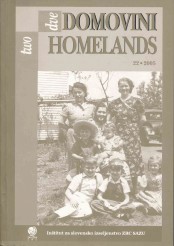IS PRIMARY SCHOOL IN SLOVENIA JUST AND FAIR: THE CASE OF MIGRANT CHILDREN FROM FORMER YUGOSLAVIA
Keywords:
justice, immigrants from fonner Yugoslavia, etemenlary school, teacher's opinionsAbstract
Deriving from Rawl’s comprehension of equity, educational system should – to be competent to be termed just – ensure formally equal chances for education and at the same time, level objective differences between scholars or offer different pupils different with the aim of reaching identical results. The educational system should not fulfil those demands on formal, institutional level only; it must necessarily operate on the level of communication as well. It demands a teacher that is sensitive to what is in certain cases just for different pupils and what is not, one who is capable of arguing professionally why a certain pupil is treated differently than others. The contribution reveals through the studying of immigrants from former Yugoslavia how the above-mentioned equity is being realised within the Slovene educational system. Initially it displays what the educational system enables immigrants from former Yugoslavia on the formal level. In continuation, a question is asked – what the attitude of the teachers towards them is. In doing so, it derives from an analysis of a questionnaire carried out on a representative pattern of class and subject teachers in Slovene primary school.
From the answers of the teachers, a conviction is clearly understood that the school must be just to the children of immigrants in the sense that it does not segregate children, which means they are not to be given lessons separately in special classes or schools. Less sensibility is perceived on issues whether and what should be different for immigrant children to enable them success identical to that of their coevals. The question whether teachers are sufficiently sensible to the problematic of immigrant children cannot be comprehended outside formal frames of the Slovene educational system. Namely, the educational legislation itself is discrepant. From the aspect of general principles, it mentions equity of school, principles of equal chances with the right of the individual to dissimilarity; however, in concrete realisations it denies all the above-mentioned. The principle of equal chances remains from the standpoint of children of immigrants on a declarative level. Immigrant children are within the Slovene educational system not granted adequate attention of the profession and policy, and consequently of the teachers.
Downloads
References
Dolenc, D. (2004), Priseljevanje v Slovenijo iz obm očja nekdanje Jugoslavije po II. svetovni vojni, Percepcije slovenske integracijske politike, (edited byK om ac, M., M edvešek, M.), Ljubljana: Inštitut za narodnostna vprašanja, p. 37-88.
Klopčič, v., Komac, M., Kržišnik-Bukić, V. (2003), Albanci, Bošnjaki, Črnogorci, Hrvati, M akedonci in Srbi v Republiki Sloveniji, Ljubljana: Inštitut za narodnostna vprašanja.
Kodelja, Z. (2001), Pravičnost: najpomembnejša vrlina šole kot socialne institucije, Sodobnapedagogika, No. 5, p. 8-1 8.
Lukšič-Hacin, M. (1995), Ko tujina postane dom, Ljubljana: Znanstveno in publicistično središče.
M arentič Požarnik, B. (1993), Kako sc učijo učitelji; kognitivni pogled na učiteljev profesionalni razvoj in posledice za izobraževanje učiteljev, Vzgoja in izobraževanje, No. l,p . 13-15.
Medveš, Z. (2002), Nova paradigma pravičnosti v šoli, Sodobna pedagogika, No. 5, p. 24-41.
Razdevšek-Pučko, C .(1 990), Spremembe v stališčih in značilnosti posameznih obdobij v poklicnem razvoju učiteljev, Učitelj, vzgojitelj — družbena perspektiva, Bled: ZDPDS, p. 147—149.
Rawls, J. (1999), A Theory o f Justice, Oxford: University Press.
Roter, P. (2004), Vloga jezika v integracijskem procesu, Percepcije slovenske integracijske politike, (edited by Komac, M., Medvešek, M.), Ljubljana: Inštitut za narodnostna vprašanja, p. 237—268.
Skubic Ermenc, K. (2004), Prispevek k razpravi o posebnihpotrebah z vidika učencev priseljencev, Vzgoja in izobraževanje, No. 6, p. 53-56.
Skubic Ermenc, K. (2003), Enakost izobraževalnih možnosti v slovenski osnovni šoli s perspektive interkulturnosti. Doctoral thesis, Ljubljana: Univerza v Ljubljani, Oddelek za pedagogiko in andragogiko.
Sm yth, G. (200 1), Odziv učiteljev na dvojezične učence v šestih osnovnih šolah na Škotskem: etnografska študija, Sodobna pedagogika, No. 2, p. 100-121.
Šolska zakonodaja (1996), Ljubljana: M inistrstvo za šolstvo in šport.
Ustava Republike Slovenije (1991), Uradni list, No. 33.
Urejanje problem atike šolanja otrok priseljencev v Sloveniji (2004), Eurydice
Zupan, M. (2004), Zamižati ali ukrepati, Šolski razgledi, No. 18, p. 3.
White Paper on Education in the Republic o f Slovenia (1996). (edited by Krek, J.), Ljubljana: Ministry ofE ducation and Sport.
Downloads
Published
How to Cite
Issue
Section
License

This work is licensed under a Creative Commons Attribution-NonCommercial-NoDerivatives 4.0 International License.
Authors guarantee that the work is their own original creation and does not infringe any statutory or common-law copyright or any proprietary right of any third party. In case of claims by third parties, authors commit their self to defend the interests of the publisher, and shall cover any potential costs.
More in: Submission chapter





